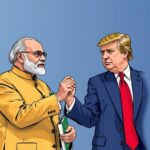Politics
AB, AJ, AJAY SRIVASTAVA, ASIA, BBC, CENTRE FOR, CHICAGO, DONALD TRUMP, ECONOMICS, GEOPOLITICS, INDIA, INTERNATIONAL RELATIONS, MICHAEL KUGELMAN, MOD, MODI, MUMBAI, NA, NARENDRA MODI, NATIONAL SECURITY, NORTH AMERICA, SOUTH ASIA INSTITUTE, SRIVAS, SRIVASTAVA, TA, TAHAWWUR RANA, TRADE, TRUMP, UNITED STATES, US, WASHINGTON, WILSON CENTER
Nia Simpson
Key Takeaways from Modi-Trump Talks: Strengthening U.S.-India Relations
During the Modi-Trump talks, the focus was on practical agreements amidst a working visit atmosphere. Key outcomes included expanded U.S. military sales and trade negotiations aimed at reaching $500 billion by 2030. Concerns regarding reciprocal tariffs and Modi’s response to media queries characterized the discussions, alongside significant defense and tech collaborations with U.S. firms.
The recent talks between Indian Prime Minister Narendra Modi and U.S. President Donald Trump were primarily focused on pragmatic developments rather than ceremonial grandeur, characteristic of a working visit. Trump highlighted the expansion of U.S. military sales to India, including potentially offering F-35 jets, and proposed increasing oil and gas exports to address the trade deficit. Aside from this, the U.S. approved the extradition of Tahawwur Rana, a businessman with alleged ties to the 2008 Mumbai terror attack.
One significant discussion point during the visit was the potential impact of Trump’s directive for reciprocal tariffs on U.S. trading partners. With India achieving a trade surplus with the U.S., the Indian government preemptively reduced its average tariffs to mitigate the risk of countermeasures. Experts note that this ongoing situation remains uncertain and complex, with differing opinions on the necessity of concern regarding reciprocal tariffs.
Both nations have set an ambitious goal to double trade to $500 billion by 2030, focusing on negotiations for a trade agreement to be pursued by autumn 2025. The specifics of such a trade deal, whether it will be comprehensive or more restricted in scope, remain unclear. Nevertheless, analysts emphasize the opportunity this agreement provides for tariffs reduction and enhanced relations between India and the U.S.
In defense collaboration, U.S.-India arms trade has grown significantly, particularly with U.S. military sales amounting to $20 billion, positioning the U.S. as India’s third-largest arms supplier. While the proposed increase in military equipment sales is welcomed, experts warn about existing bureaucratic hurdles and the complexities of exporting sensitive technologies. Despite challenges, India’s defense partnership with the U.S. is expected to deepen, especially with previous delays in Russian arms deals.
Additionally, Modi’s meeting with Elon Musk raised topics around artificial intelligence and emerging technologies, although the progress on Tesla’s plans to enter the Indian market remains ambiguous. Modi’s engagement with Musk suggests India’s intent to attract significant technology investments, especially amidst ongoing discussions about electric vehicle manufacturing incentives.
Remarkably, Modi participated in a joint press conference with Trump, addressing questions regarding illegal immigration and recent legal allegations against the Adani Group. This interaction marked a rare departure from Modi’s typical media engagement style, underscoring the evolving dynamics between India and the United States in a global context.
Overall, the Modi-Trump discussions reflect a strategic approach towards enhancing U.S.-India relations, particularly in terms of trade, defense collaborations, and technological advancements. The establishment of clear strategies and ongoing dialogue will play a critical role in navigating the complexities of tariffs and trade agreements. Despite challenges, the potential for mutually beneficial outcomes exists as both countries work towards solidifying their partnership.
Original Source: www.bbc.com








Post Comment